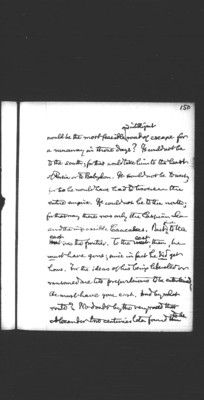Pages
86
150
would be the most feasible and intelligent road of escape for a runaway in those days? It would not be to the south; for that would take him to the heart of Persia or to Babylon. It would not be to west, for so he would have had to traverse the entire empire. It could not be to the north; for that way there was only the Caspian Sea and the impassible Caucausus. But just to the east was the frontier. To the east, then, he must have gone; since in fact he did get home. For the ideas of his being liberated or ransomed are too preposterous to be entertained. He must have gone east. And by what route? No doubt by the very road that Alexander two centuries later found to be
87
152
the best. In fact, it was the only road. In any other direction eastward was the great desert. Eastward, then, he certainly did go. Where would that road take him? Certainly to Arya, that country after which we call our supposed race, the Aryans. What route he would have gone from there is not quite so evident. Alexander here turned to the south and after penetrating the desert was obliged to turn back again. However, one thing is certain; Pythagoras must in some way have got down through Afghanistan and Beluchistan to the mouth of the Indus and must there have taken passage home by way of Suez. All this is absolutely forced upon us from the moment that we assent to the proposition that Pythagoras was captured
88
154
by the Persians.
There are some further consequences to be drawn from the supposed fact of this journey. Pythagoras never could have accomplished his escape without help. He must have sought it. He must have sought sympathy. Sympathy and help he would and (without a doubt I say it) did find among the very men whom he would naturally have desired to become acquainted with, the priests and the philosophers. In Arya he would have found Brahmins. Now Clemens and several other authorities inform us that he did
89
156
derive some of his doctrines from the Brahmins. The German higher critics have denied this. They naturally would, because their grand principle of criticism is that whatever your only witnesses say is false. They seek to reconstruct ancient history in defiance of all the testimony out of the ????ei? of an inhabitant of a German university town. But Dr. L. von Schroeder, the eminent Sanskritist, has proved pretty conclusively that there are half a dozen features of the Pythagorean doctrine which can have had no other origin than a Brahminical origin. There is one consequence more; pretty doubtful I admit, yet worth taking into account. That region about
90
158
Aria has a remarkable connection with a great fact of our intellectual history, since it is there that we find the first traces of the what we call the Arabic system of numerical notation. The first four figures are said to be nothing else than the initials of the names of the first four numbers in an alphabet found in that region. The old name for vulgar arithmetic in Chaucer, mentioned also in Recorde's Grounde of Artes, the earliest arithmetic in the English language is augrim. Now this word “augrim” is nothing but the corruption of Al-Kwarizmi, which means the man[?] Chorasmia, being the surname of the mathematician who originally introduced our vulgar




